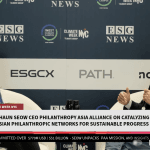Closing Remarks for the UN Global Leaders Summit 2022

Whatever problems may be plaguing the world — and currently there are almost too many to count — cooperation is the key to moving forward. That is the conclusion of the final segment of the two-day, 26-part United Nations Global Compact Leaders Summit.
Wrapping up more than 24 hours of continual coverage — “chasing the sun around the world,” as more than one speaker noted, in various locales — the Summit closed with three hopeful messages from government leaders, before giving way to final remarks from Sanda Ojiambo, Assistant Secretary-General of the UN and CEO of the United Nations Global Compact, and Amina Mohammed, Deputy Secretary-General of the United Nations.
The theme of international cooperation was evident even in the titles and portfolios of two of the government speakers: Dr. Rania A. Al-Mashat is Minister of International Cooperation for the Arab Republic of Egypt and Marina Sereni is Vice Minister of Foreign Affairs and International Cooperation in the Italian government.
“We’re at a critical juncture,” noted Al-Mashat, as we absorb “a cascade of critical shocks.” But she noted that these challenges we face offer an opportunity. “We need to turn this moment of crisis into a moment of international cooperation, stepping up collective action around food, energy, and finance. We need to strengthen multilateral dialogue, to ensure that years of progress is not erased.” Egypt will host COP 27 in November, and Al-Mashat previewed that convening, promising the world “will speak with one voice.”
Cooperation was the theme of Sereni’s address, as well. “Recovery from the pandemic is a challenge,” she observed. “The public and private sector must band together to build back better.” She also encouraged and challenged the private sector to help devise new development models, based less on competition and more on collaboration. “Development can’t be based solely on GDP growth, but on a more sustainable model for all using the five pillars: People, Planet, Prosperity, Peace, and Partnerships.”
A last-minute addition to the lineup was Norway State Secretary Bjorg Sandkjaer, who voiced similar concerns. “Two years into the COVID-19 pandemic, we hope the worst is over,” she said. “In building back better after the crisis, we need the private sector onboard.” Sandkjaer zeroed in specifically on SDG2, Zero Hunger, and SDG 14, Life Below Water. “In order to reach SDG 14,” she noted, “we need to protect prosperity for the ocean. Investors, researchers and regulators must act together.”
The three government speakers followed a presentation of the UNGC’s SDG Pioneer Awards, recognition by the UNGC of incredible work being done by innovators from China to India to Ukraine.
In revisiting the highlights of the previous 24 hours, Ojiambo pointed to the “Business Action to Advance Children’s Rights” panel, co-presented by UNICEF and Save the Children, which celebrated the 10-year anniversary of Children’s Rights and Business Principles, co-authored by UNGC, UNICEF, and Save the Children. She also referenced the live look at the Stockholm Plus 50 conference; the participation of the UN Environment Programme, the International Labour Organization, the UN High Commissioner for Refugees, and the UN Office on Drugs and Crime. Lastly, she thanked the “stellar cast of global leaders from all walks of life” who took part in the event.
Formally closing the proceedings, Mohammed said “the war in Ukraine enflamed the three-dimensional global challenge of food, energy, and finance.” But that there was hope, and that the “SDGs are a North Star.” Noting we we “less than eight years from 2030, we must turbocharge investment strategies to rescue the SDGs. We can only achieve the SDGs through collective action.”
The closing sequence was quite clear: Cooperation is essential to navigating our way out of the multitude of crises we face.
This article is part of a series covering the UN Global Compact Leaders Summit. The UN Global Compact (UNGC) Leaders Summit is an annual convening of global stakeholders from the UN, the public and private sectors, and civil society that takes stock of progress of the SDGs so far, and addresses the gaps in knowledge, resources, and funding. The 2022 Leaders Summit, like last year’s summit, will be a hybrid event of live and virtual speakers. Featured venues this year include an in-person event held in Bangkok, as well as virtual plenaries in Latin America, Australia, East Asia, the Middle East, and Africa, in addition to UN Headquarters in New York. This inclusive global event — which will run continuously for more than 24 hours — aims to empower business leaders at every level to take collective action and inspire future leaders to embed a sustainability mindset in their work. ESG News is the exclusive media partner of the event, and will cover all 26 panels.
Contributor: Lance Gould








